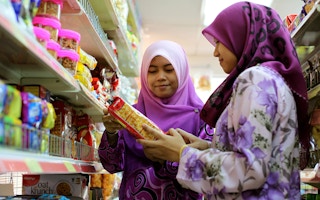From air to water to land, Southeast Asia continues to grapple with some of the world’s toughest environmental challenges. Worsening chronic air pollution, intensified by coal-fired power station emissions and slash-and-burn agricultural practices, blanket entire parts of the region in haze and is linked to 20,000 deaths annually.
And what was contained to the region’s shores has now burst onto international headlines: an ever-growing plastic pollution problem. China, Indonesia, the Philippines, Thailand and Vietnam are responsible for more than half the world’s plastic use.
As one of the most vulnerable regions to climate change, countries in Southeast Asia have some of the world’s biggest increases in greenhouse gas emissions. Meanwhile, consumers are facing food safety scandals sparking fears of a tainted food supply chain and concerns for long-term food security.
Women as first responders
But there’s a silver lining. We are hearing more and more about how women are taking charge as crisis first responders on the forefront of tackling these sustainability challenges.
Considering that women make up to 80 per cent of purchasing decisions globally, we wanted to understand how they are responding on the ground in Southeast Asia, so USAID Green Invest Asia conducted a 30-question online survey to hear from them directly. And we learned just how determined and decisive they have been in the face of large-scale, systemic, industrial challenges.
“
Greenwashing marketing no longer fools women.
Some of these changes are obvious and easy– for example, 63 per cent of women are reducing their energy use and 56 per cent are recycling at home. However, this is just the tip of the iceberg. Women are looking to make systemic change – as consumers, as investors, as employees.
Women want companies to make genuine, meaningful efforts to reduce their environmental and social footprints. It is getting harder to fool women with “greenwashing,” or environmental marketing not backed by substantive company action and investment.
Women are willing to pay for firms and companies that do the least harm to people and the environment. For example, with food purchases, many women are paying a premium of up to 30 per cent for sustainably certified products. As women dominate household purchasing decisions, companies – particularly food businesses – should pay close attention.
But it doesn’t stop there. Women in Southeast Asia are also thinking about how they can enact change through their investment decisions. Almost 85 per cent of women surveyed want to invest in responsible companies that think about their environmental and social impact.
Interestingly we also found that women have a better grasp than men when it comes to understanding how sustainable investing can reap benefits beyond simply delivering financial returns.
More men than women believe that that investing sustainably will result in lower financial returns, despite there being increasing evidence to the contrary.
As employees, women in the region want to work for companies that have a strong business ethic, with equal pay and diversity policies in place. From work to home to the community, women’s preferences should increasingly shape everything from policies to product lines and services.
A big opportunity
Knowing and understanding what women are looking for and the changes they are making is a must for businesses that want to stay competitive.
Businesses and investors have a massive opportunity to unequivocally cater to women’s sustainability journeys. Women want companies and financial institutions to do more, in particular bring more products and services to market, fulfilling demand for more sustainable options.
However, there is more business and investment firms can do than add products. Our survey identified how women are held back from fully living out their sustainability values because they feel there is a lack of trusted, clear and comprehensive information on what companies are doing to improve their environmental and social performance.
Women read the fine print. They screen and assess options carefully to make informed decisions and want to be convinced that sustainability efforts are genuine before investing their resources. The female economy is a growing marketplace.
“
Women feel there is a lack of trusted, clear and comprehensive information on what companies are doing to improve their environmental and social performance.
Women who want to invest responsibly value transparent and accessible information on sustainable investment products and want financial advice to guide them in digest information and options.
For banks and wealth managers, there is an exciting prospect to offer advisory services on investment opportunities that can drive positive change in the region.
Women want to support those playing their part in building a cleaner, more sustainable future for Southeast Asia. The message is clear. Are businesses listening?
Caterina Meloni is a gender and social inclusion advisor at USAID Green Invest Asia while Jessica Robinson is founder of Moxie Future, a female-focused sustainable investment platform.











